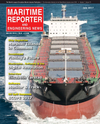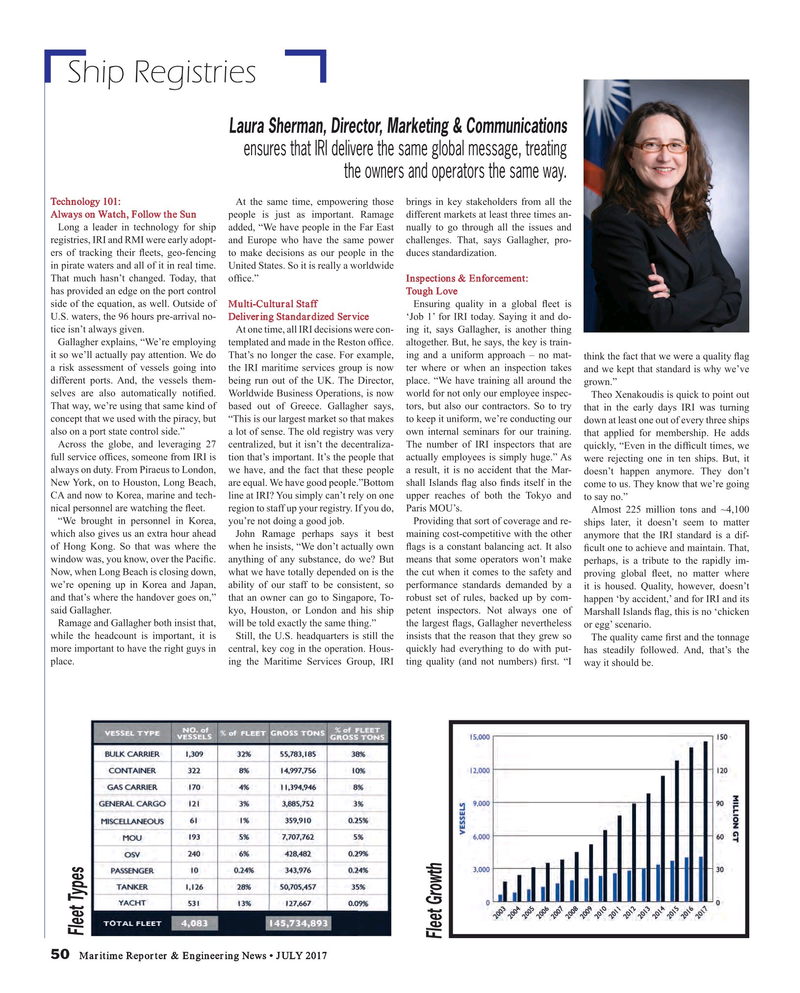
Page 50: of Maritime Reporter Magazine (July 2017)
The Marine Communications Edition
Read this page in Pdf, Flash or Html5 edition of July 2017 Maritime Reporter Magazine
Ship Registries
Laura Sherman, Director, Marketing & Communications ensures that IRI delivere the same global message, treating the owners and operators the same way.
Technology 101: At the same time, empowering those brings in key stakeholders from all the
Always on Watch, Follow the Sun people is just as important. Ramage different markets at least three times an-
Long a leader in technology for ship added, “We have people in the Far East nually to go through all the issues and registries, IRI and RMI were early adopt- and Europe who have the same power challenges. That, says Gallagher, pro- ers of tracking their ? eets, geo-fencing to make decisions as our people in the duces standardization.
in pirate waters and all of it in real time. United States. So it is really a worldwide
That much hasn’t changed. Today, that of? ce.” Inspections & Enforcement: has provided an edge on the port control Tough Love side of the equation, as well. Outside of Multi-Cultural Staff Ensuring quality in a global ? eet is
U.S. waters, the 96 hours pre-arrival no- Delivering Standardized Service ‘Job 1’ for IRI today. Saying it and do- tice isn’t always given. At one time, all IRI decisions were con- ing it, says Gallagher, is another thing
Gallagher explains, “We’re employing templated and made in the Reston of? ce. altogether. But, he says, the key is train- it so we’ll actually pay attention. We do That’s no longer the case. For example, ing and a uniform approach – no mat- think the fact that we were a quality ? ag a risk assessment of vessels going into the IRI maritime services group is now ter where or when an inspection takes and we kept that standard is why we’ve different ports. And, the vessels them- being run out of the UK. The Director, place. “We have training all around the grown.” selves are also automatically noti? ed. Worldwide Business Operations, is now world for not only our employee inspec-
Theo Xenakoudis is quick to point out
That way, we’re using that same kind of based out of Greece. Gallagher says, tors, but also our contractors. So to try that in the early days IRI was turning concept that we used with the piracy, but “This is our largest market so that makes to keep it uniform, we’re conducting our down at least one out of every three ships also on a port state control side.” a lot of sense. The old registry was very own internal seminars for our training. that applied for membership. He adds
Across the globe, and leveraging 27 centralized, but it isn’t the decentraliza-
The number of IRI inspectors that are quickly, “Even in the dif? cult times, we full service of? ces, someone from IRI is tion that’s important. It’s the people that actually employees is simply huge.” As were rejecting one in ten ships. But, it always on duty. From Piraeus to London, we have, and the fact that these people a result, it is no accident that the Mar- doesn’t happen anymore. They don’t
New York, on to Houston, Long Beach, are equal. We have good people.”Bottom shall Islands ? ag also ? nds itself in the come to us. They know that we’re going
CA and now to Korea, marine and tech- line at IRI? You simply can’t rely on one upper reaches of both the Tokyo and to say no.” nical personnel are watching the ? eet. region to staff up your registry. If you do, Paris MOU’s.
Almost 225 million tons and ~4,100 “We brought in personnel in Korea, you’re not doing a good job. Providing that sort of coverage and re- ships later, it doesn’t seem to matter which also gives us an extra hour ahead
John Ramage perhaps says it best maining cost-competitive with the other anymore that the IRI standard is a dif- of Hong Kong. So that was where the when he insists, “We don’t actually own ? ags is a constant balancing act. It also ? cult one to achieve and maintain. That, window was, you know, over the Paci? c. anything of any substance, do we? But means that some operators won’t make perhaps, is a tribute to the rapidly im-
Now, when Long Beach is closing down, what we have totally depended on is the the cut when it comes to the safety and proving global ? eet, no matter where we’re opening up in Korea and Japan, ability of our staff to be consistent, so performance standards demanded by a it is housed. Quality, however, doesn’t and that’s where the handover goes on,” that an owner can go to Singapore, To- robust set of rules, backed up by com- happen ‘by accident,’ and for IRI and its said Gallagher.
kyo, Houston, or London and his ship petent inspectors. Not always one of Marshall Islands ? ag, this is no ‘chicken
Ramage and Gallagher both insist that, will be told exactly the same thing.” the largest ? ags, Gallagher nevertheless or egg’ scenario. while the headcount is important, it is Still, the U.S. headquarters is still the insists that the reason that they grew so
The quality came ? rst and the tonnage more important to have the right guys in central, key cog in the operation. Hous- quickly had everything to do with put- has steadily followed. And, that’s the place. ing the Maritime Services Group, IRI ting quality (and not numbers) ? rst. “I way it should be.
Fleet Types
Fleet Growth 50 Maritime Reporter & Engineering News • JULY 2017
MR #7 (50-57).indd 50 MR #7 (50-57).indd 50 7/6/2017 1:01:27 PM7/6/2017 1:01:27 PM

 49
49

 51
51
